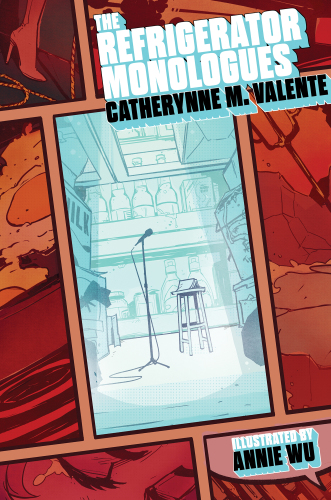
The Refrigerator Monologues
کتاب های مرتبط
- اطلاعات
- نقد و بررسی
- دیدگاه کاربران
نقد و بررسی

Starred review from April 17, 2017
Reviewed by Gwenda Bond
Bestseller Valente’s dazzling new story cycle creates its own comic book universe, complete with the gorgeously wrought prose pyrotechnics that readers have come to expect from her. She’s well known for her skill at unpacking the hidden truths embedded in fairy tales and archetypes; here she turns that skill on the troubling treatment of women in comic books, a perfect fit between author and subject matter. This is Valente at her sharpest and most pointed, ably assisted by illustrations from comics artist Annie Wu (Black Canary).
The title is a combined hat tip to Eve Ensler’s The Vagina Monologues and to “Women in Refrigerators” or “fridging,” the term that comics writer Gail Simone coined to sum up the common trope in which female comics characters meet tragic ends purely to advance the hero’s story and character development. (The term originated with 1994’s Green Lantern #54, in which hero Kyle Rayner’s girlfriend, Alexandra DeWitt, is killed by the villain Major Force and left in his refrigerator.) Valente’s slim book is both a critique of the fridging phenomenon and a rage-filled pleasure all its own.
Deadtown is a back corner of Hell where women wear the clothes they were buried in. “It’s always autumn in Deadtown,” the book begins. “It’s always the middle of the night, even at nine in the morning. We call ourselves the Hell Hath Club. There’s a lot of us. We’re mostly very beautiful and very well-read and very angry.” This club of deceased superhero girlfriends, wives, and associates meets at the Lethe Café, where a gargoyle named Neil slings espresso. It’s here in Deadtown where six women tell their own stories for a change, one by one: Paige Embry, Julia Ash, Pauline Ketch, Blue Bayou, Daisy Green, and Samantha Dane.
Comics fans will recognize echoes of Gwen Stacy’s perilous fall, Atlantean Queen Mera’s madness after her son’s tragic death, Karen Page’s journey to becoming a porn star and addict, and, of course, DeWitt’s ignominious end. But no comic book expertise is required to appreciate the brilliantly furious, self-contained stories here, which also happen to be slyly hilarious (Atlantis neighborhoods include East Gillage and Squid Row). This incisive and impressive collection—which arrives at a time of real changes in the comics world, with more women creators and more women in the spotlight as heroes—gives me hope that one day the fridging trope will find itself in Deadtown too, never to return to the land of the living.
Gwenda Bond is the author of the Lois Lane series of young adult novels.

April 15, 2017
In a slim book of linked short stories, Valente (The Girl Who Raced Fairyland All the Way Home, 2016, etc.) frees the voices of women from the world of comic-book superheroes.In Deadtown, Valente's vividly imagined land of the dead, a group of dead women gather at the Lethe Cafe to share their stories with each other. They call themselves the Hell Hath Club, and they have each suffered, disastrously and violently, through their relationships with superheroes. Paige Embry was a lab intern who created a mysterious substance that turned her boyfriend into the crime-fighting Kid Mercury and spawned a supervillain. Julia Ash was a superhero in her own right, with powers that grew ever stronger and eventually turned her fellow superheroes against her. Samantha Dane embodied the term that inspired the title of the book: she was an actual woman in a refrigerator, gruesomely murdered to serve as a plot device in the narrative of her boyfriend and his freshly minted powers. The world of the Hell Hath Club is packed with delightful details--in the land of the dead, the entertainment is excellent and includes burned-down theaters, forgotten songs, and all the beloved rock stars and actresses the world has lost--and enough solidity that you can imagine the comics these characters might have come from even though they do not exist. The stories are entertaining but not a romp. Valente chooses to eschew the soothing route of "saving" her heroines or even letting them save themselves. Instead, she gives them strong voices and allows them to rage, mourn, and regret. She gives them, and the reader, the chance to be furious at the common use of death and incapacitation of women as lazy plot points and reminds us that other stories are always possible. A ruthless but absorbing and provocative reshaping of the idea that the girlfriend dies, again.
COPYRIGHT(2017) Kirkus Reviews, ALL RIGHTS RESERVED.

Starred review from May 15, 2017
"Refrigerated" comic book women are characters who are abused, killed, or otherwise taken out of the story line, usually to a comic (male) superhero's benefit. Valente introduces six members of the Hell Hath Club, refrigerated women who gather at the local coffee shop to share their stories of how they arrived in Deadtown, either by accident or through the intent of their superhero boyfriends or their own superpowers. Tales of a villainous face-off, a choice between good and evil, a savior-turned-destroyer, and more chronicle the devastating effects of love and hate. VERDICT Valente (Radiance, Palimpsest) proves her adroitness with imagery and emotion in this extraordinary book of linked stories.--KC
Copyright 2017 Library Journal, LLC Used with permission.

























دیدگاه کاربران